❀She/Her❀ ❀INTJ❀ ❀Currently a biology graduate (hoping for a PhD in vet med)❀ ❀Fairy academia❀ ❀Tracking #thelegendofstudy❀ No TERFs, homophobs, nazis, zionists, pedos, racists, sexists or anti-sciencers allowed.
Don't wanna be here? Send us removal request.
Text
It’s a privilege to study, many women around the world are barred from this human right: to read, write and learn. Be grateful anytime your pen touches paper, or you are learning theorems developed by intelligent, hardworking men and women from ages ago.
It’s a pleasure and a privilege to learn. Not only is it a privilege to study, but you should be aiming and striving to take science, medicine, law, philosophy, art further than the marker we have reached. It’s a comforting thought to think, from your work generations of humanity down the line will benefit.
How many brilliant women were in the shadows of amazing feats of science and technology and life changing patents? Contribute while you can. If you pour into knowledge - it will pour back into you.
2K notes
·
View notes
Text
Guess who's getting her master's!

18 notes
·
View notes
Photo
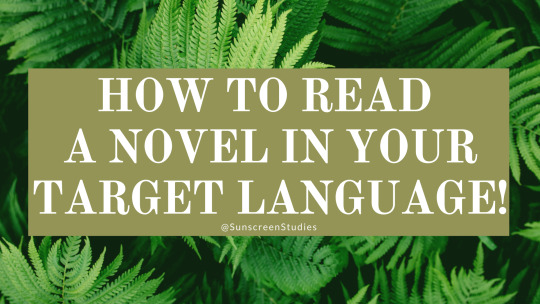
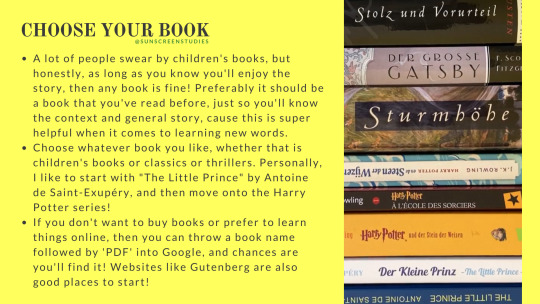
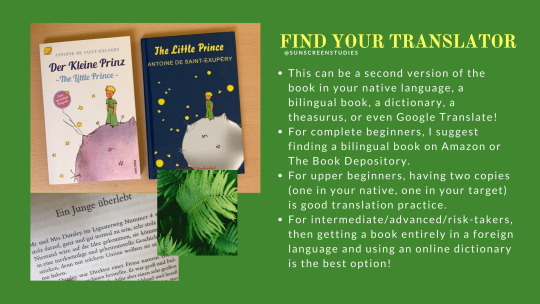
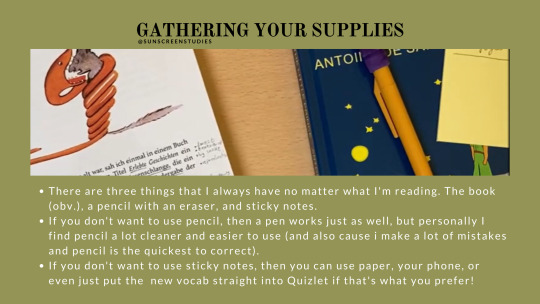
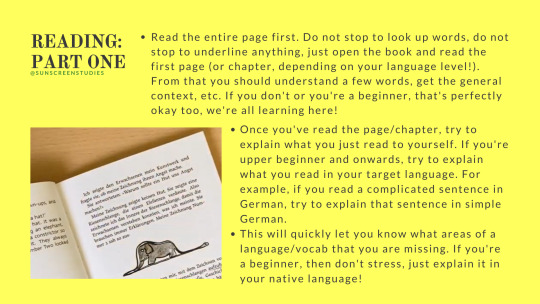

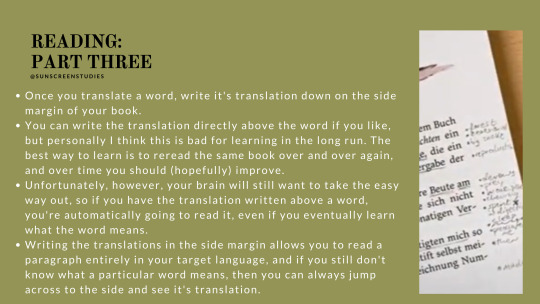
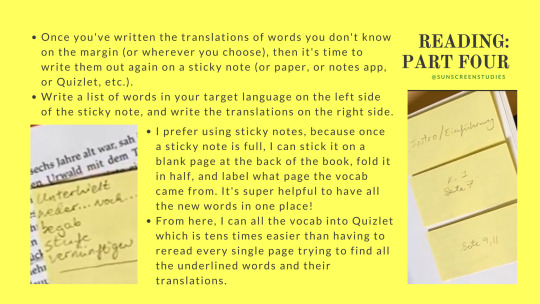
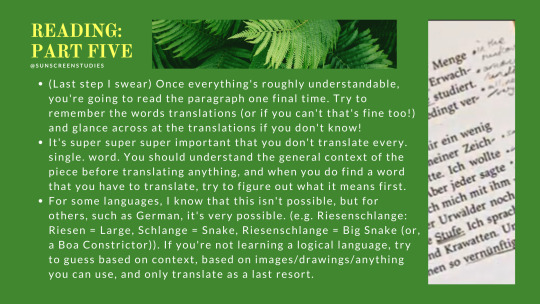
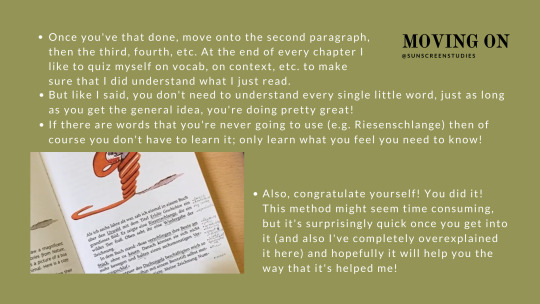
How to Read a Novel in Your Target Language
Watch the video here!
Or click the ‘keep reading’ button to read a transcript!
Keep reading
260 notes
·
View notes
Text
This studyblr is ANTI all-nighter, ANTI overexertion, PRO mental wellness, PRO self care, PRO getting enough sleep
9K notes
·
View notes
Text

Bodies of Water Vocabulary
जल निकाय, जलराशि - body of water (masculine) जलाशय - water reservoir (masculine) जल, पानी - water (masculine) * water can be प्रवाहमान, प्रवाहशील, बहने वाला (running, flowing) or ठहरा हुआ (still, standing), खारा, नमकीन (salty) or मीठा (fresh water), छिछला (shallow) or गहरा (deep). खारापन - salinity, saltiness (masculine) गहराई - depth (feminine) भूजल - groundwater (masculine) बहना - to flow (intransitive) सागर, समुद्र, समुंदर - sea (masculine) * सागर तल - 1. sea level, 2. ocean floor (masculine) * भूमध्य सागर - Mediterranean Sea (masculine) * लाल सागर - Red Sea (masculine) * काला सागर - Black sea (masculine) * मृत सागर - Dead Sea (masculine) * कैस्पियन सागर - Caspian Sea (masculine) समुद्री - marine, sea related (adjective) महासागर - ocean (masculine) * प्रशान्त महासागर - Pacific Ocean (masculine) * अटलांटिक महासागर - Atlantic Ocean (masculine) * हिन्द महासागर - Indian Ocean (masculine) * आर्कटिक महासागर - Arctic Ocean (masculine) * अंटार्कटिका महासागर - Antarctica Ocean (masculine) तालाब, पोखर - pond, small lake (masculine) * water reservoirs, lakes and ponds can be either कृत्रिम (artificial, man-made) or प्राकृतिक (natural). कुंड - terraced water reservoir (masculine) नदी - river (feminine) नाला - watercourse, channel (masculine) झील - lake (feminine), also सरोवर (masculine) * a lake or pond can be द्वीपरहित (island-less) * सुपीरियर झील - Lake Superior (feminine) झरना - 1. waterfall, also जल प्रपात (masculine) 2. spring, also सोता (masculine) * गर्म प���नी का झरना - geyser, hot water spring * नायाग्रा जल प्रपात - Niagara Falls (masculine) धारा, प्रवाह - water flow, current (masculine) * गहरे सागर की जटिल धारा - deep sea current नहर - canal (feminine) * स्वेज़ नहर - Suez Canal (feminine) तट, किनारा - coast, beach (masculine) * समुद्र तटीय seaside, coastal (adjective) जलसंधि, जलडमरूमध्य - strait (masculine) द्वीप - island (masculine) प्रायद्वीप - peninsula (masculine) खाड़ी- bay, gulf (feminine) * फ़ारस की खाड़ी - Persian Gulf (feminine) * मेक्सिको की खाड़ी - Gulf of Mexico ज्वार-भाटा - tide (masculine) * ज्वार - high tide * भाटा - ebb, low tide * ज्वार की लहर - tidal wave (feminine) * ज्वारीय प्रवाह - tidal flow, current (masculine) लहर - wave (feminine) * लहराना - to wave (intransitive) * a wave can be ऊँची (high), प्रचंड (raging) or विनाशकारी (destructive) बाढ़ - flood (feminine) * अचानक आई बाढ़ - flash flood * मौसमी बाढ़ - seasonal flood सुनामी - tsunami (feminine) हिमानी - glacier (feminine) बंदरगाह - port, harbor (feminine) मछुआरा - fisherman (masculine) तैराकी - swimming (feminine) नौकायन - sailing, yachting (feminine)
Sea Creatures
समुद्री स्तनधारी जीव - marine mammals (masculine) मछली - fish (feminine) समुद्री सिवार - seaweed (feminine) मूंगा - coral (masculine) सागर की कौड़ी - seashell (feminine) कस्तूरा - shellfish, oyster (masculine) झींगा - shrimp, prawn (masculine) केकड़ा - crab (masculine) तारामीन - star fish (masculine) अश्वमीन - seahorse (masculine) ह्वेल - whale (masculine) सूंस - dolphin (masculine) हाँगर - shark (masculine) जलव्याघ्र - sea lion (masculine) अष्टबा��ु - octopus (masculine)
18 notes
·
View notes
Text
I have a quick question for the scientists of tumblr.
I've seen on Facebook that a non-thesis based master's can kill your chances of ever going into research. Is this really true? The only programs I got into are non-thesis based, and I'm not feeling well enough for an actual job.
My end goal is a PhD so I don't want this degree to limit my prospects
#sciblr#the science side of tumblr#veterinary science#marine biology#phd#ms#dvm#women in stem#wildlife biology#college#gradblr#grad school#scientist#graduate school#university
8 notes
·
View notes
Text
"what did students do before chatgpt?" well one time i forgot i had a history essay due at my 10am class the morning of so over the course of my 30 minute bus ride to school i awkwardly used by backpack as a desk, sped wrote the essay, and got an A on it.
six months later i re-read the essay prior to the final exam, went 'ohhhh yeah i remember this', got a question on that topic, and aced it.
point being that actually doing the work is how you learn the material and internalize it. ChatGPT can give you a short cut but it won't build you the the muscles.
101K notes
·
View notes
Note
hey friend, i know you’ve been a pretty serious supporter and user of duolingo for a long time (so have i!), so i’m curious what your feeling is about the announcement that they’re going to be doubling down on using more and more AI for content creation, including using it to avoid having to hire actual humans?
personally, i’m really disappointed - i’ve disliked how much they’ve been using it so far, but the app is otherwise a great tool, and all of the other apps seem to use it, too, so it’s not easy to just jump ship to an app that isn’t using AI. i’ve seen a lot of responses that are like “hurr hurr just use a textbook idiot” which i find really unhelpful; learning from an app is easier and a lot more convenient in a lot of ways than having to use analog materials, especially if you study a high number of languages. still, i don’t ethically feel that i can keep giving them money if this is the direction they’re going.
what are your thoughts?
This is going to be a longer answer than you might have expected.
In 2001, fellow undergrad. Reiko Kataoka (now a professor at San Jose State) resurrected a club that had been dead for a few years at UC Berkeley linguistics: The Society of Linguistics Undergraduates (SLUG). One of its former undergraduate members, Alan Yu (now a professor at the University of Chicago), happened to be a graduate student at Berkeley at the time, so he helped her get it off the ground. The club was exactly what I was looking for at that time: a group for ling. undergrads. to get together and talk about language and linguistics, my new favorite thing. It was great! I even put together a couple phonology problems using my conlangs to distribute at a meeting. The following year I became the second president of the new SLUG and helped to create the SLUG Undergraduate Linguistics Symposium, where I gave my first talk on language creation. Being a part of this club was a major factor in shaping my undergraduate experience at Berkeley.
When I graduated I went to UC San Diego to pursue a graduate degree in linguistics. Part of the reason I chose UCSD was because it was an incredibly inviting atmosphere. Before we accepted they paid for prospective undergraduates down to San Diego and housed them with current grad. students who told them about the program and took them out for dinner, etc. It allowed prospective students to ask questions they wouldn't ask of professors (e.g. who's got beef with who). It was really cool, and so in our second year, we continued the tradition of housing prospective grad. students. Since we both went to Berkeley, my ex-wife (also a Berkeley ling. grad.) and I hosted Klinton Bicknell.
Klinton, it turns out, was the current president of SLUG. I didn't know him while I was at Cal, but we did overlap. It turns out he had renamed the club SLUGS, which I thought was weird. He said "It happened organically" and laughed in an off-putting way. He very much gave off the impression of someone who will smile at you and say whatever is necessary for you to go away. Klinton ended up going to UCSD the following year and I ended up leaving the following year.
Fast forward to 2016. HBO had put the kibosh on Living Language Valyrian, and so I turned to Duolingo. They had previously reached out about putting together a Dothraki course, but I declined, due to having a book out, Living Language Dothraki. With no hope for Valyrian, I asked if they'd be interested in me putting together a course on High Valyrian, which I did. I had some help at the beginning, but, truth be told, most of that course was built by me alone. I became very familiar with the Incubator, where Duolingo contributors built most of their courses. It was a bit clunky, but with enough elbow grease, you could put together something that was pretty darn good. It wasn't as shiny as their in house courses, because they couldn't do things like custom images, speaking challenges, etc., but it was still pretty good.
At the time I joined, everyone who was working in the Incubator was doing it for free. We were doing it because we wanted to put together a high quality course on our language of choice on Duolingo. When Duolingo went public, they realized this situation was untenable, so they began paying contributors. There were contracts, hourly wages, caps on billable hours, etc. It essentially became an as-you-will part time job, which wasn't too bad.
The Incubator faced a couple potentially insurmountable problems. When the courses were created by volunteers, Duolingo could say "This was made by volunteers; use at your own risk", essentially. Once they were paid, though, all courses became Duolingo products, which means they bear more responsibility for their quality. With so many courses (I mean, sooooooooo many courses) it's hard to ensure quality. Furthermore, "quality" doesn't just mean "are the exercises correct" and "are the sentences interesting". Quality means not being asked to translate sentences like "Women can't cook" or "The boy stabbed the puppy". With literally hundreds of courses each with thousands of sentences written by contractors, there was no way for Duolingo to ensure not just that they were staying on brand with these sentences, but that they weren't writing ugly things. There were reporting systems, there were admins that could resolve things behind the scenes, but with so much content, it became a situation where they would have had to hire a ton more people or scale back.
We saw what Duolingo did before with one aspect of their platform that had a similar issue. If you remember way back, Duolingo used to have a "forum", that was a real forum, but for most users, what it meant was on every single sentence in Duolingo users could make comments. These comments would explain grammar points, explain references, make jokes, etc. It was honestly really helpful. But, of course, with any system like that comes trolls, and so volunteers who had come to create language learning resources also found themselves being content reviewers, having to decide which comments to allow, which to delete, who to ban, etc. As Duolingo became more popular, the troll problem grew, and so eventually Duolingo's response was to kill the forum. This mean you were no longer able to see legitimate, helpful comments on sentences. They threw the baby out with the bathwater.
This is why it was no surprise to me when they shuttered the Incubator. The technology was out of date (from their standpoint, you understand. Their in house courses were way more sophisticated, but they couldn't update the Incubator without potentially breaking hundreds of courses they hadn't created themselves), quality assurance was nearly impossible, and they were also paying people to create and maintain these out-of-date courses they had no direct control over. Of course they closed it down. It would've taken a massive investment of time and resources (and capital) to take the Incubator as it was and turn it into something robust and future proof (think old Wordpress vs. Wordpress now), and Duolingo wanted to do other things, instead—like math and music. And so the Incubator died.
But that wasn't the only reason. This was something we heard internally and then heard later on publicly. There was rumbling that Duolingo was using AI to help flesh out their in house courses, which was troubling. This was before the big Gen AI boom, but after a particularly pernicious conlang-creation website I won't name had come to exist, so it caught my attention. I decided to do a little digging and see what this was all about, and I ended up with a familiar name.
Klinton Bicknell.
Indeed, the very same Klinton Bicknell was the head of all AI ventures at Duolingo. Whether enthusiastically or reluctantly or somewhere in between, he was absolutely a part of the decision to close the Incubator and remove all the contractors who had created all the courses that gave Duolingo its reputation. (Because, seriously, why did most of us go to Duolingo? Not for English, Spanish, French, and German.)
I know you sent this ask because of the recent news about Duolingo, but, to be honest, when I saw one of these articles float across my dash I had to check the date, because to me, the news was old. Duolingo isn't just now replacing contractors with AI: They already did. That was the Incubator; those were contractors. That is why there won't be more new language courses on Duolingo, and why the current courses are frozen. This isn't news. This is the continuation of a policy that had already firmly in place, and a direction that rests solidly on the shoulders of Klinton Bicknell.
But you don't have to take my word for it. He's talked about this plenty himself:
Podcast (Generative Now)
Article in Fast Company
Article in CNET
Google can help you find others.
At this point there's a sharp and baffling division in society with respect to generative AI. On the one hand, you have those of us who disapprove of generative AI on a truly fundamental level. Not only is the product something we don't want, the cost—both environmental and ethical—is utterly insupportable. Imagine someone asking you, "Hey, would you like a sandwich made out of shoelaces and shit?" And you say, "God, no, why would anyone ever want that?!" And their response is, "But wait! To make this sandwich out of shoelaces and shit we had to strangle 1,000 kittens and drain the power grid. Now do you want it?"
On the other side, there are people who are still—I mean today—saying things like, "Wow! Have you heard of this AI thing?! It's incredible! I want AI in everything! Can AI make my table better? Can I add AI to my arthritis? We should make everything AI as quickly as possible!"
And conversations between the two sides go roughly like this:
A: Good lord, now they're using AI art on phone ads? Something has to stop this… B: Yeah, it's so cool! Look, I can make a new emoji on my phone with AI! A: Uhhh…what? I was saying it's bad. B: Totally! I wonder if there's an AI shower yet? Like, it could control the temperature so you always have the perfect shower! A: Do you know how much power it takes to run these genAI apps? At a time when we're already struggling with income inequality, housing, inflation, and climate change? B: I know! We should get AI to fix that! A: But AI is the problem! B: Hey ChatGPT: Teach me how to surf!
It's frustrating, because the B group is very much the 💁 group. It's like, "Someone was using ChatGPT and it told them to kill themselves!" and they respond, "Ha, ha! Wow. That shouldn't have happened. What a learning opportunity! ☺️ Hey ChatGPT: How do you make gazpacho?" There's a complete disconnect.
In terms of what you do with your money, it's a difficult thing. For example, I've used Apple computers consistently since 1988. I'm fully immersed in the Apple ecosystem and I love what they do. They, like every other major company, are employing AI. If you go over to r/apple any time one of these articles comes out, it's all comments from people criticizing Apple for not putting together a better AI product and putting it out faster; none saying that they shouldn't be doing it. They're all ravenous for genAI for reasons that defy my understanding. And so what do I do? I've turned off the AI features on all my Apple devices, but beyond that, I'm locked in. From one direction, I look like a hypocrite for using devices created by a company that's investing in AI. From the other direction, though, I am using their devices to say what they're doing is fucking despicable, and they should stop—and I'll keep doing so so long as there's breath in my body.
Duolingo isn't necessary the way that, say, a computer or phone is nowadays. Duolingo is still usable for free, though, of course, they make it a frustrating experience to use its free service. (This is certainly nothing exclusive to Duolingo. That's the way of everything nowadays: streaming services, games, social media... Not "Well give you cool things if you pay!" but "We'll make your life miserable if you don't!") If you do use their Incubator courses, though, I can assure you that those are AI-free. lol They're too outdated to have anything like that. Some of those courses are bigger than others; some are better than others. But all of them were put together by human volunteers, so there's that, at least. At this point, I don't think Duolingo needs your money—nor will they miss it. They're on a kind of macro plane at the moment where the next ten years will either see the company get even bigger or completely disintegrate; there's no in between. They're likely going to take a big swing into education (perhaps something like Duolingo University [Duoversity?]) and it's either going to make a ton of money or bankrupt them. I guess we'll have to wait and see.
I've taken the Finnish course in its entirety and we're doing Hungarian now, and I've learned a lot—not enough, but a lot. I'm grateful for it. I like the platform, and I agree with the basic tenets of the language courses (daily shallow intake is better than occasional deep intake; implicit learning ahead of explicit instruction is better than the reverse). I'm grateful they exist, I'm grateful we can still use them (because they can always retire all of them, remember), and I think it's brought a lot of positivity to the world. I think Luis Van Ahn is a good guy and I hope he can steer this thing back on course, but I'm not putting my money on it.
347 notes
·
View notes
Text
"For every scientist, whether researcher, technologist, or teacher, of whatever competence in mathematics, there exists a discipline in science for which that level of mathematical competence is enough to achieve excellence"
-Edward O. Wilson
2 notes
·
View notes
Text















Here's an update to my book collection (2025). More is coming soon.
Jane Austen - Pride and Prejudice
Emily Bronte - Wuthering Heights
Louisa May Alcott - Little Women
Charlotte Bronte - Jane Eyre
Jane Austen - Sense and Sensibility
Edith Wharton - The Age Of Innocence
Jane Austen - Emma
Gustave Flaubert - Madame Bovary
Jane Austen - Northanger Abbey
Edith Wharton - The House of Mirth
Jane Austen - Persuasion
Louisa May Alcott - Good Wives
Nathaniel Hawthorne - The Scarlet Letter
Charlotte Bronte - The Professor
Leo Tolstoy - Anna Karenina (Part 1)
Leo Tolstoy - Anna Karenina (Part 2)
Jane Austen - Mansfield Park
Anne Bronte - Agnes Grey
Thomas Hardy - Far from The Madding Crowd
William Makepeace Thackeray - Vanity Fair (Part 1)
William Makepeace Thackeray - Vanity Fair (Part 2)
Pierre-Ambroise-François Choderlos de Laclos - Dangerous Liaisons
Alexandre Dumas fils - The Lady of the Camellias
Henry James - Washington Square
Louisa May Alcott - A Garland For Girls
Henry James - The Portrait of A Lady (Part 1)
Henry James - The Portrait of A Lady (Part 2)
Jane Austen - Lady Susan. The Watson. Sanditon
Anne Brontë - The Tenant of Wildfell Hall
Thomas Hardy - Tess of the D’Urbeville
Edith Wharton - The Mother’s Recompense
Daniel Defoe - Moll Flanders
Henry James - The Wings of the Dove
Edith Wharton - The Customs of the Country
Kate Chopin - The Awakening
Jane Austen - Juvenilia
George Eliot - Middlemarch (Part 1)
George Eliot - Middlemarch (Part 2)
George Sand - Nanon
Henry James - The Ambassadors
Elizabeth Gaskell - Cranford
Thomas Hardy - Under The Greenwood Tree
Edith Wharton - Summer
George Sand - Indiana
Henry James - The Bostonians
George Eliot - Silas Marner
Henry James - The Golden Bowl (Part 1)
Henry James - The Golden Bowl (Part 2)
Edith Wharton - The Twilight Sleep
Emily Eden - The Semi-Attached Couple
Edith Wharton - The Glimpses of the Moon
Mary Elizabeth Braddon - Lady Audley’s Secret
George Eliot - The Mill on the Floss
Elizabeth Gaskell - Mary Barton
Fanny Burney - Evelina
George Sand - Little Fadette
Emily Eden - The Semi-detached House
Charlotte Brontë - Shirley (Part 1)
Charlotte Brontë - Shirley (Part 2)
Daniel Defoe - Lady Roxana
Theodor Fontane - Effie Briest
Edith Wharton - The Cliff
Thomas Hardy - Two on a Tower
Frances Hodgson Burnett - A Lady of Quality
Louisa May Alcott - Moods
Lucy Maud Montgomery - The Story Girl
Elizabeth Gaskell - Ruth
Thomas Hardy - The Woodlanders
Elizabeth Gaskell - North and South
Matilde Serao - Fantasy
Thomas Hardy - A Pair of Blue Eyes
Emilia Pardo Bazán - Sunstroke/Insolacion
Ann Radcliffe - The Romance of the Forest
Louisa May Alcott - A Long Fatal Love Chase
Charlotte Bronte - Vilette
Sybil Grace Brinton - Old Friends and New Fancies
Edith Wharton - Bunner Sisters
Virginia Woolf - The Voyage Out
Margaret Oliphant - The Chronicles of Carlingford Series by Mrs. Oliphant
Edith Nesbit - The Incomplete Amorist
Virginia Woolf - Day and Night
Guy de Maupassant - Our Heart
Frances Trollope - The Widow Barnaby (Part 1)
Frances Trollope - The Widow Barnaby (Part 2)
Elizabeth Gaskell - Half a Lifetime Ago
Frances Hodgson Burnett - The Secret Garden
114 notes
·
View notes
Text
Look, I knew five languages by age 19 and now I am learning like 3 more. I work as a language instructor and a consultant. If I can give language learners only one advice, this is it.
STOP LEARNING WORDS ON THEIR OWN.
You're doing yourself a disservice by learning lists of "30 words you must know!" "100 most common words!" like it literally means nothing if you cannot use those words in an appropriate context with proper grammar. So what you actually need to do is learn those words via example sentences.
Of course, sentences have more words so you may think you're learning less but you're actually learning the way to use it in context. That's what's important.
Language is about communication, which also means if you want to learn languages, you have to observe how people communicate with each other universally. Native speakers never have a list of words they know and they don't count every single new word they've learned. So why are you doing it to yourself? What native speakers do is listen to the new word, remember the context they're spoken in, and keep using that word in that context. And that's why people go "wait, you can use that word LIKE THAT?" all the time. So you, a language learner, are also allowed to do that. I'm not even saying those word lists are useless but they're the most useful AFTER you've known most of them and are trying to go over them for practice etc. Native speakers do click on those word lists to check out how many words they don't know or to remind themselves of those words or to learn some facts about each word. That should be your goal as well.
Learn sentences. Learn them in context. Do not fall into the "I must know xx amount of words or I'm a failure at language learning" trap perpetuated by bloggers or youtubers or whatever. Have fun with it!
984 notes
·
View notes
Text
A few words for food in a Children’s book

I found an old children’s book and was curious about some of the terms they used for translating food terms. Books like these were common in my childhood which were just bilingual word lists. Each word will be listed along with their translation in the book, then my comments. I am not doing every word, just those that intrigued me. This book was first published in 2001.
পাউরুটি paauruʈi – loaf –This is what we call what is typically “bread” in English. Bread with yeast is not native to South Asian culture and the word was borrowed from the Portuguese word for bread pão.
রুটি ruʈi – bread – I have always translated this as flatbread, which is what English anyways uses to refer to Middle East unleavened breads
ছানা chhana – casein, posset – technically, yeah, the casein milk protein is what this is. But nobody really calls this that in ordinary language, right? This is cottage cheese, or queso fresco. And posset is made with cream, right?
পায়েস payesh – frumenty – Even I don’t know who thought of this word? Payesh already has a very clear equivalent in the western world, rice pudding, that’s basically what it is. Frumenty is like some medieval word! Frumenty is also apparently made with wheat, so not even the ingredient is correct.
খই khoi – fried-rice – fried usually implies oil, but this isn’t fried. Online I found it called parched rice, but in Bangla they used the word “bhaja” which usually means to fry. This is basically rice krispies.
খিচুড়ি khichuɽi – hotchpotch – amusing, because I guess that’s what it is, a bunch of rice, lentils and vegetables mixed in one pot. I have always translated this as “yellow rice” but there is no correct answer, because khichuri is a cultural term usually not translated.
মোরব্বা morɔbba – jam – Made me laugh and roll off the bed. This is basically candied stuff. In the western world you have things like candied ginger, orange peel, etc. In our culture the principle item used to make this is ash gourd.
পোলাউ polau – rick-rice – no comment, what the hell? Is this even a real food name? Polau is what you call pilaf.
মিশরি mishri – candy – I can accept this. This is basically what we call rock sugar.
সরবত shɔrbɔt – syrup – Interesting translation because of the way I personally experienced this word. It’s used to mean lemonade here. A lebu (lime/ lemon) shorbot is lemonade. But I suspect it is also used for other fruit juices too, like Rooh Afza. Syrup to me is the juice concentrate or sugar liquid that needs to be diluted but shorbot is not a concentration that needs dilution, it is the drink itself.
ঝোল jhol – soup – My family calls this word “gravy”. To be specific, when we make a meat curry, this is what the liquid portion of the curry is called. In our culture, after adding meat and spices to a pot, we put water and let it boil. After boiling, the liquid part of that is called jhol.
গুড় guɽ - treacle – Treacle is a liquid. This Bangla word simply refers to unrefined sugar, which can be solid or in the form of a syrup. Usually we but the solid form, a literal brick of brown sugar.
5 notes
·
View notes
Text
why are so many people surprised when dyslexic people struggle to read 😭😭
5 notes
·
View notes
Text
I'm trying so hard to learn new languages, but doing it with dyslexia is so difficult!
#thelegendofstudy#dyslexia#language learning#to be fair asl isn't too difficult for me#but anything that's written out I can't seem to do
5 notes
·
View notes


